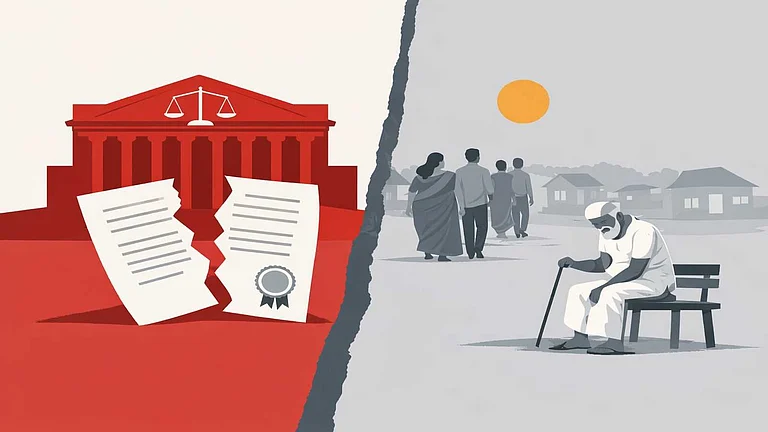The Last Will of Ratan Tata shows his generosity, as the tangible legacy he left for his loved ones, included more than two dozen beneficiaries, obviously much beyond a typical family. Tata died in October last year (2024). Reportedly, he wrote his Will two times in two different years before his ‘Last Will’ on February 23, 2022, and incorporated changes in it a couple of times later. Notably, a Will can be written as many times as one wants and the last Will is considered the final Will of a deceased.
According to a report by The Times of India, his estate worth is roughly estimated at Rs 3,900 crore, of which Rs 1,684 crore worth of assets are from his shares in Tata Sons, the holding company of the Tata Group. As per his Will, his stake in Tata Sons will go to two foundations: 70 per cent to Ratan Tata Endowment Foundation (RTEF), and 30 per cent to Ratan Tata Endowment Trust (RTET).
The remaining assets he bequeathed to his loved ones, including family, friends, neighbours, his cook, driver, office staff, and many more.
Beneficiaries In Ratan Tata’s Last Will:
As per the Will, he bequeathed his Juhu house property (worth Rs 16 crore) and his jewellery to his brother Jimmy.
He left his Alibaug property (over Rs 6 crore) and three guns to Mehli Mistry, his close friend, and his land in Seychelles (Rs 85 lakh) to RNT associates, a Singapore-registered fund with some special mentions. As per the report, it read, “It is my wish that the interest of R Venkatraman and Patrick McGoldrick in RNT Associates, India, and in RNT Associates Pte, Singapore, be protected as shareholders of both companies and be allowed to continue as shareholders as long as they desire to be associates”.
He bequeathed the residual estate (excluding his shares in Tata Sons, other Tata companies and non-Tata companies, and immovable properties) equally among three people: his half-sisters, Shireen Jejeebhoy and Deanna Jeejeebhoy, and his confidant Mohini Mohan Dutta. It includes his bank deposits worth Rs 385 crore.
As per the report, he bequeathed Rs 3.5 crore to his house and office staff.
Rata Tata ensured rewarding everyone for their contribution to his life, both during his lifetime and afterwards.
He left Rs 5 lakh each for the four executors of his will, which include his two half-sisters, Shiree Jejeebhoy and Deanna Jejeebhoy, friend Mehli Mistry, and Tata Trust Trustee Darius Khambata.
Executor Seeking Probate Of The Will:
According to the report, among the three beneficiaries of Ratan Tata’s residual estate, Dutta disagrees with the executors over the valuation of his inheritance. The executors approached the Bombay High Court seeking probate of the Will.
What Is Probate?
As per the Indian Succession Act, 1925, probate is a Will certified by a court of law.
Radhika Gaggar, Partner (co-head - private client), Cyril Amarchand Mangaldas, explains, “Probate is a certificate issued by a competent court, authenticating the Will of the deceased testator and also granting administration of the estate of the deceased testator to the executor named under the Will. Probate is proof of representative title of the executor to act in terms of the Will”.
Yuvraj Sharma, Advocate, Delhi High Court, says, “Through probate proceedings, the court verifies the will’s validity and authenticity, confirms the executor’s appointment, identifies beneficiaries, and assesses the estate’s value”.
Is Probate Mandatory And When Is It Done?
Probate renders authenticity to a Will but it is not mandatory except in a few cases.
“Probate is mandatory in certain situations. In case of a will made by a Hindu, Buddhist, Sikh, Jain, or Parsi, if the Will is made in Kolkata, Chennai, and Mumbai; or the Will is made outside these cities, but relates to immovable property situated within those limits, it is mandatory to obtain probate of the Will”, clarifies Gaggar.
As the probate is for verifying a Will, it is done only after the testator’s (the person who makes a Will) demise.
Says Dr. Richa Mehta, Partner, Gandhi Law Associates: “Probate is always done after the testator's demise. A will has no legal effect until the death of the testator, and probate is the process of proving its validity posthumously”.
In Tata's case, the executors applied for probate, and a clause in the Will, the 'non-contest clause', came to light.
What Is A ‘No-Contest Clause’? Is It A Substitute For Probate?
Gaggar explains, “A ‘No-contest’ clause is essentially a condition included by the testator in the Will, along the lines that in case any beneficiary institutes any legal proceedings to challenge or contest validity of the Will, the interest of such beneficiary under the Will shall automatically stand forfeited. Usually, such clauses are inserted by testators to ensure that their directions and wishes expressed under the Will are accepted, respected, and honoured by the beneficiaries without any interference or friction”.
So, in a way, this clause limits the unnecessary contesting of a Will, because it forfeits a beneficiary’s rights to the bequeathed asset.
However, it should not be confused as a substitute for probate. Gaggar says that this clause may be added in a Will but it is not a substitute for obtaining probate.
“It is important to note that a no-contest clause is not a substitute for probate. Even a will containing a no-contest clause must undergo probate where it is legally mandated, particularly in Presidency towns like Mumbai, Chennai, and Kolkata", clarifies Mehta.
Validity Of No-Contest Clause:
Sharma highlights that the Indian Succession Act, 1925, and the Hindu Succession Act, 1956 (governing inheritance for Hindus), do not recognise the “No contest Clause” or “in terrorem” clauses. Despite this, these clauses are occasionally included in wills or trusts as precautionary measures. However, courts are not bound by such stipulations”.
Mehta explains it further, saying, “While the Indian Succession Act, 1925 does not explicitly recognise or prohibit no-contest clauses, Indian courts may uphold them if they are clearly worded, not vague, and do not contravene public policy or the principles of natural justice”.
So, the clause, though not recognised or prohibited in law, remains a measure to discourage beneficiaries from unnecessarily contesting a will.
In Ratan Tata’s case, the plea for probate was submitted last week.




















